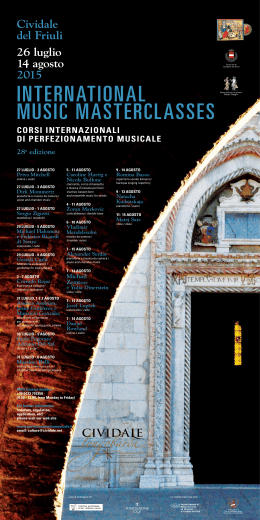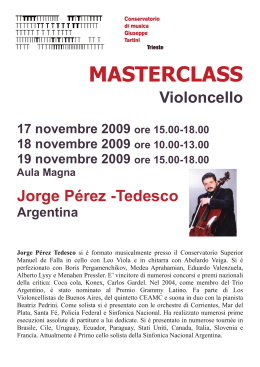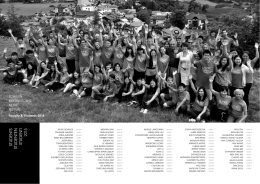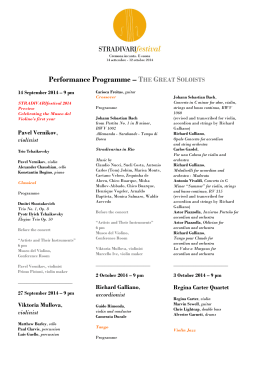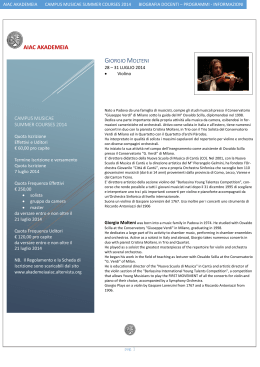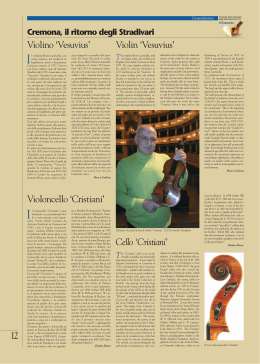© BfÖ 2015 SOZIOLOGIE IN ÖSTERREICH – INTERNATIONALE VERFLECHTUNGEN Österreichischer Soziologie Kongress 1.-3. Oktober 2015 (Universität Innsbruck) SOZIOLOGIE IN ÖSTERREICH – INTERNATIONALE VERFLECHTUNGEN Österreichischer Soziologie Kongress Universität Innsbruck Institut für Soziologie Institut für Musikwissenschaft 1.-3. Oktober 2015 EINLADUNG zu einer musikalischen Plenarveranstaltung im Rahmen des Österreichischen Soziologie Kongresses 2015 Marco Bernardin (Cello), Luca Mengoni (Violine), Alberto Nones (Klavier) Voices from the two World Wars, for violin and piano and for trio Claude Debussy (1862-1918) Sonata for Violin and Piano (1917) Kontakt: Mag. Mag. Sven Jeschke Büro des Dekans der Fakultät für Politikwissenschaft und Soziologie Universitätsstraße 15, 6020 Innsbruck Tel.: +43 512 507-96135 Fax: +43 512 507-9804 E-Mail: [email protected] Riccardo Zandonai (1883-1944) Trio-Serenata for Piano, Violin and Cello (1943) http://oegs.ac.at/kongress/ Freitag, 02.10.2015, 17:00-18:15 Raum: Kaiser-Leopold-Saal, Katholisch-Theologische Fakultät Karl-Rahner-Platz 3, 6020 Innsbruck Marco Bernardin (Trento, 1950), after teaching Chamber Music at the Conservatory of Venice and Cello at the Conservatory of Parma, has been from 1982 to 2015 Professor of Cello at the “G. Verdi” Conservatory of Milan. Many of his pupils play in important orchestras (Teatro alla Scala, Filarmonica della Scala, Tonhalle of Zürich, “Verdi” Orchestra of Milano, Camerata Salzburg) and some play as soloists. He studied Cello with Libero Rossi and Chamber Music with Bruno Mezzena in Trento, graduating at the Conservatory of Piacenza in 1973 with M° Rossi. In parallel to his musical studies, he studied Physics at the University of Milan, graduating in 1977. From 1974 to 1983 he played as second cello in the Angelicum Orchestra of Milan. His concert activity includes numerous concerts in duo (with harpsichord or piano), trio, quartet, octet and other ensembles. He collaborated with orchestras such as RAI (Milan), “Haydn” Orchestra of Bozen and Trento, and the Orchestra of the Pomeriggi Musicali di Milano. Luca Mengoni graduated with full marks in 1997 at the “G. Rossini” Conservatory of Pesaro under the guidance of M° R. Segreto. He has subsequently attended Masterclasses on orchestral practice studying with M. Fornaciari, P. Toso, D. Rossi, S. Pagliani, P. Prencipe, G. Franzetti, M. Marin and L. Spirer, as well as at the Academy Of Mastery for Soloists with M° Steriu and Dora Bratchkov, F. Manara and A. Perpich. He later graduated with full marks and distinction in viola, and he is now completing a Master’s in Baroque violin at the Conservatorio “B. Maderna” in Cesena. He regularly plays both as a soloist and as part of chamber ensembles (“Quartetto Eudora”; “Trio Voyage”). He is founding member of “Quintetto Gigli” which collaborates with the international opera project “Villa InCanto”. He also collaborates with various orchestras, among which the Orchestra Filarmonica Marchigiana, the Camerata Gigli (founding member) and the Solisti Piceni. Luca Mengoni teaches violin at the Civica Scuola di Musica “B. Gigli” in Recanati and at the Istituto “Vaccaj” in Tolentino. Moreover, he is founder, teacher and conductor of the Chamber Orchestra “Sinfonietta Gigli” of Recanati, which has performed with artists such as Andrea Bocelli, Leo Nucci, Lorenzo Di Bella and Ottavia Maria Maceratini. He has often been Jury member in music competitions, among which the “A. Postacchini” International Violin Competition. He plays a Roddiman violin (1768). Alberto Nones (Trento, 1975) studied Piano with Professor Antonella Costa at the “F. A. Bonporti” Conservatory of Trento, Italy, earning his Diploma degree summa cum laude in 1997. In competitive piano performance, Nones has won three 1st prizes, three 2nd prizes and five 3rd prizes at piano competitions. He specialized with renowned masters, such as Franco Scala, under whose guidance he received in Cremona a Diploma of specialization in 2003. Nones also graduated summa cum laude in Philosophy at the University of Bologna, went on to study at the London School of Economics, where he earned a Master of Science in Political Theory, and completed his education in the humanities with a PhD in International Studies at the University of Trento. He has taught at a number of institutions, including the University of the United Arab Emirates and the University of Trento, and is currently teaching “Musical Dramaturgy” and “Music Management” at the University of Teramo. As a researcher, Nones was “Marie Curie” Researcher at the University of Cambridge and “Fulbright” and Post-Doc at Princeton University, where he undertook research on the political philosophy in Giuseppe Verdi’s operas. Radio Rai collaborator, he is the author of three books: Zandonai: un musicista nel vento del Novecento (UCT, 2014); Ascoltando i Doors: l’America, l’infinito e le porte della percezione (Mimesis, 2014); Ascoltando Verdi: scrigni di musica, filosofia politica e vita (ABEditore, 2013). Forthcoming is a Chopin biography, as well as a double CD with his recording of the complete Mazurkas by Chopin. Programm Begrüßung Dekan Univ.-Prof. Dr. Helmut Staubmann Präsident der Österreichischen Gesellschaft für Soziologie und Dekan der Fakultät für Politikwissenschaft und Soziologie, Universität Innsbruck Studiendekanin ao.Univ.-Prof. Mag. Dr. Monika Fink Studiendekanin der Philosophisch-Historischen Fakultät, Institut für Musikwissenschaft, Universität Innsbruck Marco Bernardin (Cello) Giuseppe-Verdi-Konservatorium, Mailand Luca Mengoni (Violine) Institut „Vaccaj“ Tolentino & Musikschule „B. Gigli“ in Recanati Alberto Nones (Klavier) Universität Teramo Voices from the two World Wars, for violin and piano and for trio Claude Debussy (1862-1918) Sonata for Violin and Piano (1917) I. Allegro vivo II. Intermède. Fantastique et léger III. Finale. Très animé Riccardo Zandonai (1883-1944) Trio-Serenata for Piano, Violin and Cello (1943) I. Moderato calmo II. Tempo di Valzer. Piuttosto lento III. Lento, grave e angoscioso – Allegro agitato – Lento e grave The Violin Sonata is Debussy‘s last work. Completing it was difficult, both because the pace of war in 1917 produced additional hardship and because Debussy‘s illness often left him exhausted. The work combines national und international musical influences. Zandonai composed the Trio-Serenata in 1943, during the Second World War. The piece, which only reached its final form by stages, has a dream-like shadowy quality which takes it outside of rigorously constructed schemes into the realm of nostalgic thoughts and memories.
Scaricare

